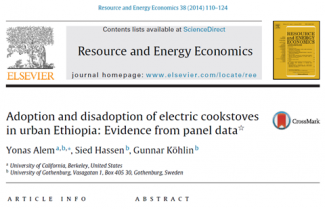FILTER
Displaying 2351 - 2360 of 3605 publications
Previous studies on improved cook stove adoption in developing countries use cross-sectional data, which make it difficult to control for unobserved heterogeneity and investigate what happens to…
15 August 2014 | Peer Reviewed | Ethiopia, Global HubPrevious studies of poverty in developing countries have to a great extent focused on the characteristics of the household head and used these as proxies for the underlying ability of the household to…
15 August 2014 | Peer Reviewed | Ethiopia, Global HubThe hake (Merluccius capensis and M. paradoxus) directed offshore demersal trawl is the most economically important fishing sector in South Africa, generating 30,000 jobs and comprising more than 50%…
10 August 2014 | Peer Reviewed | South AfricaThis study reviews the nature and outcomes of policies, incentives and management procedures in the Namibian hake industry from independence in 1990 to the present. It is argued that, although based…
10 August 2014 | Peer Reviewed | South AfricaWe use inverse probability weighting to examine the effects of a unique two-pronged common-property forestry program in the Gimbo district of Ethiopia, which includes Joint Forestry Management and…
10 August 2014 | Peer Reviewed | South AfricaHighlights • We develop the first comprehensive survey of residential energy consumption in China. • A typical Chinese household in 2012 consumed 1426 kilograms coal equivalent. • Space heating…
5 August 2014 | Peer Reviewed | ChinaWhen designing choice experiments for nonmarket valuation the role of the price attribute is of major importance. In the energy sector the uncertainty of future direction of changes in prices makes it…
1 August 2014 | Peer Reviewed | SwedenWe examine the effect of the introduction of uniform water-charging for aquifer management and provide evidence using a survey-based choice experiment of agricultural water users in rural Tunisia…
24 July 2014 | EfD Discussion Paper | South AfricaThis paper examines the impact of climate change on poor households across South Africa who practice subsistence farming to supplement their household income and dietary requirements. We consider…
21 July 2014 | Peer Reviewed | South AfricaThat wealthier developing country households may rely more heavily on child labor than poorer households has come to be known as the “wealth paradox.” This paper tests for a wealth paradox with regard…
21 July 2014 | EfD Discussion Paper | Central America
